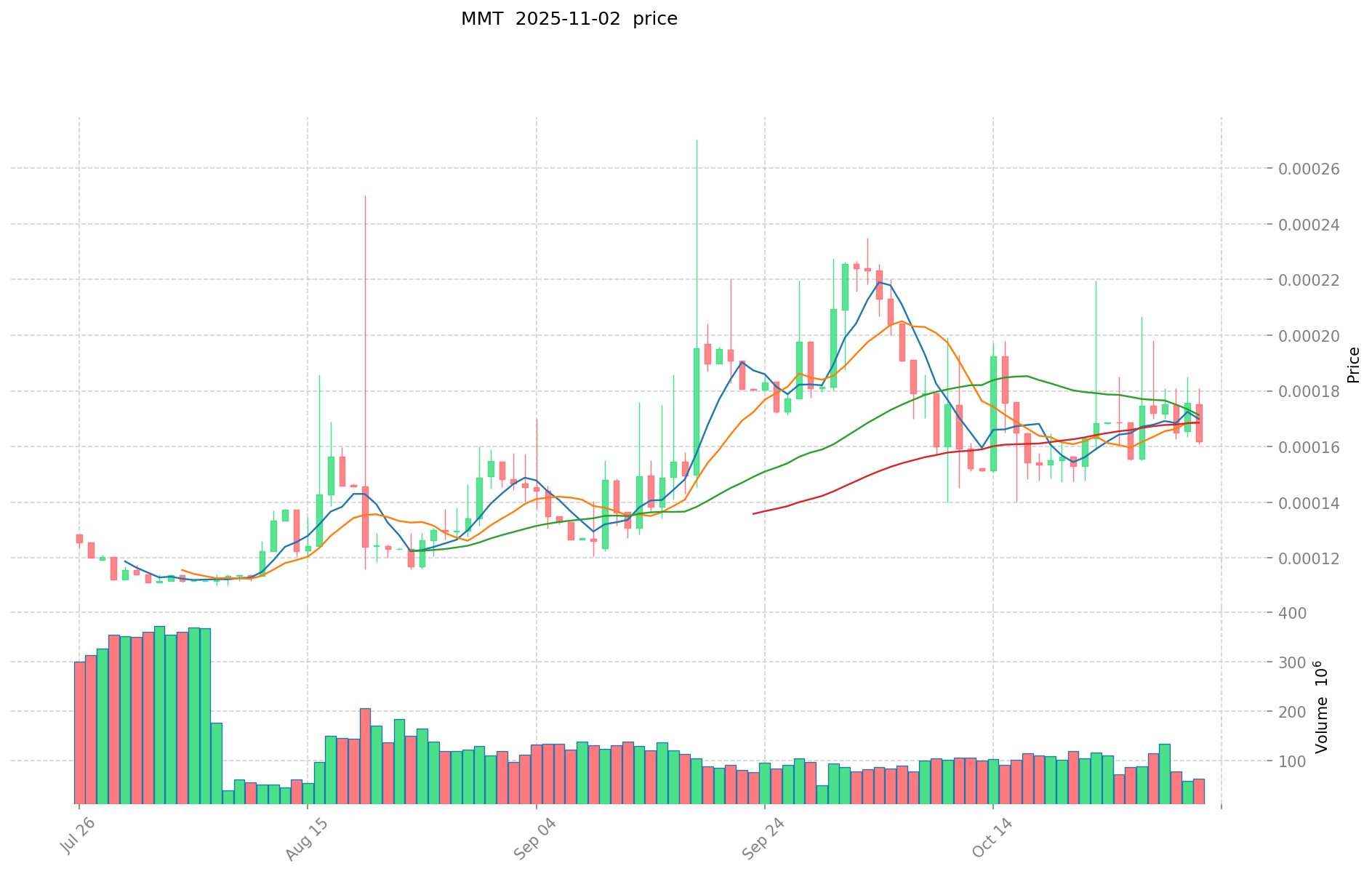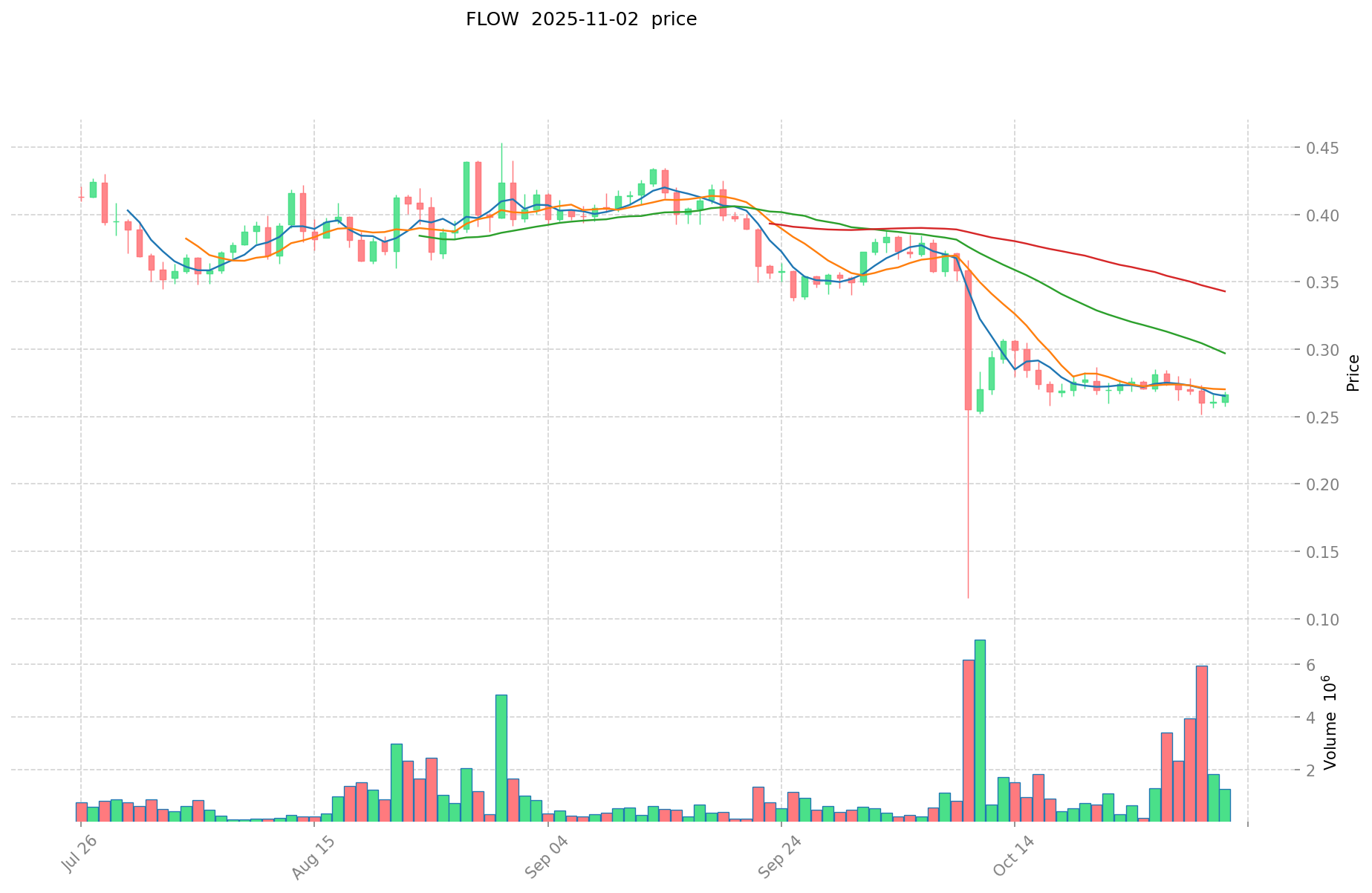MMT vs FLOW: A Comparative Analysis of Multi-Modal Translation and Feature-Level Optical Workflow
Introduction: Investment Comparison of MMT vs FLOW
In the cryptocurrency market, the comparison between MeMusic vs Flow has been an unavoidable topic for investors. The two not only show significant differences in market cap ranking, application scenarios, and price performance, but also represent different positioning in the crypto asset space.
MeMusic (MMT): Launched in 2024, it has gained market recognition for its focus on reshaping the value flow in the audio industry.
Flow (FLOW): Since its inception in 2020, it has been hailed as a platform for next-generation games, applications, and digital assets, becoming one of the cryptocurrencies with significant global trading volume and market capitalization.
This article will provide a comprehensive analysis of the investment value comparison between MeMusic and Flow, focusing on historical price trends, supply mechanisms, institutional adoption, technological ecosystems, and future predictions, attempting to answer the question most concerning to investors:
"Which is the better buy right now?"
I. Price History Comparison and Current Market Status
MeMusic (MMT) and Flow (FLOW) Historical Price Trends
- 2024: MMT experienced a significant price drop due to the overall crypto market downturn.
- 2021: FLOW reached its all-time high of $42.40 on April 5, influenced by the NFT boom.
- Comparative analysis: During the recent market cycle, MMT dropped from its high of $0.06 to a low of $0.00008984, while FLOW declined from $42.40 to a low of $0.156967.
Current Market Situation (2025-11-02)
- MMT current price: $0.00015916
- FLOW current price: $0.2705
- 24-hour trading volume: $10,499.24 (MMT) vs $568,826.94 (FLOW)
- Market Sentiment Index (Fear & Greed Index): 33 (Fear)
Click to view real-time prices:
- Check MMT current price Market Price
- Check FLOW current price Market Price


Understanding MMT vs FLOW: Core Investment Value Factors
Theoretical Foundations
- MMT (Modern Monetary Theory): Based on government's ability to issue currency; views money as the issuer's IOU; focuses on fiscal policy's role in creating net financial assets
- FLOW: Investment value primarily derived from company operational performance and financial health; follows traditional corporate finance principles
- 📌 Key Distinction: MMT represents a macroeconomic theory while FLOW represents a traditional corporate investment
Monetary Mechanics
- MMT: Government spending creates money; taxation destroys money rather than funding spending; emphasizes sovereign currency issuers face no financial constraints
- FLOW: Value depends on company's ability to generate profits, cash flows, and return on investment over time
- Central Banking Role: In MMT, central banks coordinate with treasury departments, while FLOW follows conventional market valuation metrics
Fiscal vs Corporate Performance
- MMT Focus: Government deficits create private sector surpluses; fiscal policy as primary economic tool
- FLOW Focus: Corporate earnings, market position, and business fundamentals determine investment return
- Measurement Metrics: MMT uses sectoral balance sheets while FLOW uses traditional financial analysis
Economic Environment Considerations
- Inflation Impact: MMT considers inflation a constraint only at full employment; FLOW value affected by inflation's impact on corporate earnings
- Interest Rates: MMT views rates as policy tools; FLOW valuation directly affected by discount rate changes
- Market Cycle Sensitivity: FLOW typically more sensitive to economic cycles than MMT policy implementations
III. 2025-2030 Price Prediction: MMT vs FLOW
Short-term Prediction (2025)
- MMT: Conservative $0.000143244 - $0.00015916 | Optimistic $0.00015916 - $0.0002244156
- FLOW: Conservative $0.178068 - $0.2698 | Optimistic $0.2698 - $0.380418
Mid-term Prediction (2027)
- MMT may enter a growth phase, with prices expected between $0.0001733761712 and $0.00028390348034
- FLOW may enter a consolidation phase, with prices expected between $0.3838887072 and $0.4158794328
- Key drivers: Institutional capital inflow, ETFs, ecosystem development
Long-term Prediction (2030)
- MMT: Base scenario $0.000295987501482 - $0.000337908478087 | Optimistic scenario $0.000337908478087 - $0.000393663376971
- FLOW: Base scenario $0.54623524147488 - $0.6827940518436 | Optimistic scenario $0.6827940518436 - $0.6827940518436
Disclaimer: The above predictions are based on historical data and current market trends. Cryptocurrency markets are highly volatile and subject to rapid changes. These projections should not be considered as financial advice. Always conduct your own research before making investment decisions.
MMT:
| 年份 | 预测最高价 | 预测平均价格 | 预测最低价 | 涨跌幅 |
|---|---|---|---|---|
| 2025 | 0.0002244156 | 0.00015916 | 0.000143244 | 0 |
| 2026 | 0.000241652628 | 0.0001917878 | 0.000126579948 | 20 |
| 2027 | 0.00028390348034 | 0.000216720214 | 0.0001733761712 | 36 |
| 2028 | 0.000257821202585 | 0.00025031184717 | 0.000172715174547 | 57 |
| 2029 | 0.000337908478087 | 0.000254066524877 | 0.000195631224155 | 59 |
| 2030 | 0.000393663376971 | 0.000295987501482 | 0.000269348626348 | 85 |
FLOW:
| 年份 | 预测最高价 | 预测平均价格 | 预测最低价 | 涨跌幅 |
|---|---|---|---|---|
| 2025 | 0.380418 | 0.2698 | 0.178068 | 0 |
| 2026 | 0.47465914 | 0.325109 | 0.25033393 | 20 |
| 2027 | 0.4158794328 | 0.39988407 | 0.3838887072 | 47 |
| 2028 | 0.603664992072 | 0.4078817514 | 0.375251211288 | 50 |
| 2029 | 0.58669711121376 | 0.505773371736 | 0.41473416482352 | 86 |
| 2030 | 0.6827940518436 | 0.54623524147488 | 0.436988193179904 | 101 |
IV. Investment Strategy Comparison: MMT vs FLOW
Long-term vs Short-term Investment Strategies
- MMT: Suitable for investors focused on audio industry disruption and ecosystem potential
- FLOW: Suitable for investors interested in NFT markets and blockchain gaming platforms
Risk Management and Asset Allocation
- Conservative investors: MMT: 20% vs FLOW: 80%
- Aggressive investors: MMT: 40% vs FLOW: 60%
- Hedging tools: Stablecoin allocation, options, cross-currency portfolios
V. Potential Risk Comparison
Market Risk
- MMT: High volatility due to nascent market and limited adoption
- FLOW: Susceptible to fluctuations in NFT and gaming market trends
Technical Risk
- MMT: Scalability, network stability
- FLOW: Smart contract vulnerabilities, potential blockchain congestion
Regulatory Risk
- Global regulatory policies may have differing impacts on both tokens, particularly in relation to NFTs and digital asset classifications
VI. Conclusion: Which Is the Better Buy?
📌 Investment Value Summary:
- MMT advantages: Focused on audio industry disruption, potential for rapid growth
- FLOW advantages: Established ecosystem, strong presence in NFT and gaming markets
✅ Investment Advice:
- New investors: Consider a smaller allocation to MMT, larger position in FLOW for stability
- Experienced investors: Balanced approach, potentially higher allocation to MMT for growth
- Institutional investors: FLOW may be more attractive due to its established market presence and ecosystem
⚠️ Risk Warning: The cryptocurrency market is highly volatile. This article does not constitute investment advice. None
VII. FAQ
Q1: What are the main differences between MMT and FLOW? A: MMT focuses on reshaping the audio industry, while FLOW is positioned as a platform for next-generation games, applications, and digital assets. MMT is newer (launched in 2024) and more volatile, while FLOW has been around since 2020 and has a more established ecosystem.
Q2: Which token has performed better historically? A: FLOW has shown better historical performance, reaching an all-time high of $42.40 in April 2021. MMT, being newer, has experienced significant volatility, dropping from a high of $0.06 to a low of $0.00008984 in recent market cycles.
Q3: What are the current prices and trading volumes for MMT and FLOW? A: As of 2025-11-02, MMT's price is $0.00015916 with a 24-hour trading volume of $10,499.24. FLOW's price is $0.2705 with a 24-hour trading volume of $568,826.94.
Q4: What are the price predictions for MMT and FLOW by 2030? A: For MMT, the base scenario predicts a range of $0.000295987501482 - $0.000337908478087, with an optimistic scenario of up to $0.000393663376971. For FLOW, the base scenario predicts $0.54623524147488 - $0.6827940518436, with the same upper limit for the optimistic scenario.
Q5: How should investors allocate their portfolios between MMT and FLOW? A: Conservative investors might consider allocating 20% to MMT and 80% to FLOW, while aggressive investors might opt for 40% MMT and 60% FLOW. The exact allocation depends on individual risk tolerance and investment goals.
Q6: What are the main risks associated with investing in MMT and FLOW? A: Both tokens face market risks due to the volatile nature of cryptocurrencies. MMT has higher volatility due to its nascent market and limited adoption. FLOW is susceptible to fluctuations in NFT and gaming market trends. Both also face technical and regulatory risks.
Q7: Which token is better suited for different types of investors? A: New investors might consider a smaller allocation to MMT and a larger position in FLOW for stability. Experienced investors could take a more balanced approach, potentially with a higher allocation to MMT for growth potential. Institutional investors may find FLOW more attractive due to its established market presence and ecosystem.
Share
Content